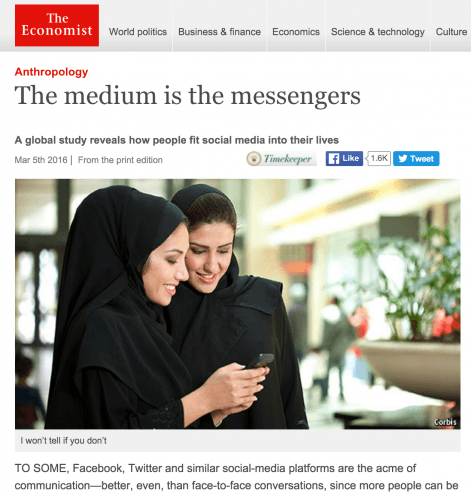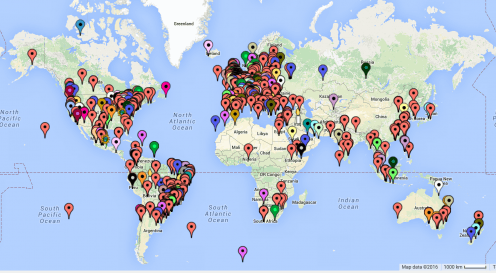Why We Post is “the biggest, most ambitious project of its sort”, says The Economist
By Laura Haapio-Kirk, on 14 March 2016
Since our launch on the 29th February, the first three open access books in the Why We Post series have been downloaded over 6,000 times! 6,000 downloads in just two weeks makes for a very happy team. The entire series of 11 volumes will continue to be released by UCL Press over the coming year, so keep your eyes peeled.
News has spread far and wide of our project and its ambitious public dissemination strategy comprising not only of our books, but a free e-course and a website with films and stories from our nine fieldsites. In the past two weeks we’ve enjoyed global media coverage and have been thrilled with the response from learners on our course who come from all over the world.
Press round-up (29/02/2016 – 14/03/2016):
English:
The Economist (05/03/2016 print and online): The Medium is the Messengers: A global study reveals how people fit social media into their lives
“These fly-on-the-wall perspectives refute much received wisdom… ‘Why We Post’ thus challenges the idea that the adoption of social media follows a single and predictable trajectory.”
The Economist – (02/03/2016 online): Babbage Podcast: From headers to footies (from 06:33)
“(Why We Post is) the biggest, most ambitious project of its sort.”
BBC World Service – (29/02/2016 radio): World Business Report (from 4:13)
BBC Click (02/03/2016 radio): What is the Point of Posting on Social Media
“… a global snapshot of our relationship with the social media… This is a nuanced picture of a world coming to terms with a rapidly evolving way of connecting, or even disconnecting, with something unexpected pretty much everywhere the researchers looked.”
“What’s really heartening about this study and the research is you see people taking the technology seriously, looking at the things it makes possible, the things that it interferes with, the new forms of social exchange that become feasible when you have smart phones and internet and social networks, actually looking at how it affects us as people. It’s really vital that this work continues… It’s a sense of a discipline emerging, or rather that the discipline of anthropology is properly embracing social media as an important part of human society… What they’re doing is identifying core principles, like the fact that social media can help create privacy. It’s a really important insight and that’s not going to change, even if it’s no longer Facebook, it’s something new.” – Bill Thompson, BBC Technology writer
CBBC Newsround (29/03/2016 TV): Two mentions of ‘footies’ on the morning and afternoon programmes.
BBC World Service – (29/02/2016 radio): World Update (from 8:51)
BBC Radio 4 (29/02/2016 radio): Today Programme (from 2:54:32)
Spanish:
BBC Mundo (05/03/2016 online): De “Footies” en Chile a “uglies” en Inglaterra, cómo el mundo cambió las redes
BBC Mundo (09/03/2016 online): La artista argentina de Instagram que engañó a miles de personas
Portuguese:
O Globo (07/03/2016 online and print): Pesquisa mostra diversidade do uso das redes sociais pelo mundo
And here are selected comments from learners on our course:
“Thank you for this course. Although I am a journalist and social media user I now have an understanding of the cross-cultural realities of social media… how it is used differently across different cultures.”
“Fantastic course. This has been a great introduction and it seems like it’s almost limitless as to where one could further go from here in these studies.”
“Really enjoyed the course. I found it extremely interesting with edifying discussions! I hope social media evolves into something truly radical rather than merely, ‘a look at me peep show for the digitally besotted’ (John Pilger)”.
The course has just entered its third week, and it’s not too late to sign up! Join the course in English on FutureLearn and in Portuguese, Tamil, Hindi, Spanish, Chinese, Turkish, and Italian on UCLeXtend.
 Close
Close








